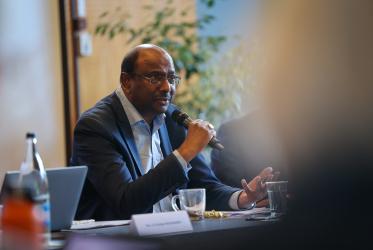The seminar marks the birth centenary of Gregorios. “He consistently uplifted the voice of people in the margins of society, through his life, actions and his teachings,” said Phiri. “It is a daunting task to reflect on the depth and width of the contributions of this deeply spiritual, and outstanding scholar, theologian, philosopher, and leader.”
Gregorios was one of the three main Bible study leaders at the WCC 3rd Assembly held in New Delhi in 1961. He served in the WCC from 1962-67 as the associate general secretary and as director of the Division of Ecumenical Action. He was the WCC Asia president from 1983-91; a member of the WCC Faith and Order Commission from 1968-75; and also served from 1963-75 as a founding member of the Joint Working Group between the Vatican and the WCC.
"The time he spent at the WCC helped cement many ecumenical relationships and led to many contributions to the global ecumenical movement,” said Phiri.
Phiri also reflected how Gregorios could easily and seamlessly move across the borders of various disciplines, faiths, and philosophies. “He identified the root problem is the disconnection and separation of our science-technology from the sacramental understanding of material reality as the bearer of God,” she said. “His wisdom, versatile mind, his forthright and respectful approach to people from all walks of life, bought him recognition and honour from the secular, religious and academic worlds,” she said.
Gregorios called for “a new enlightenment,” Phiri noted.
“Be it Egypt and Cappadocia, he reminded us all major fathers and mothers of the church in the East came from parts of Africa and Asia, and they had very different cultural and spiritual sensitivities from the Roman and European West,” she said. “Even being an academic giant, he was a keen listener, with a childlike enthusiasm to learn with constant openness to different perspectives,” she said.
Phiri also noted that Gregorios was rooted in the Bible. “Even as a prolific and deep thinker who read widely, dialogued earnestly, and wrote extensively, and authored more than 47 books, he was rooted in the Bible,” she said. “His teaching help us to chart the future, where humanity is not the measure of all things, but rather, bears a major responsibility for the welfare and sustenance of the whole creation.”
Read the full text of the inaugural address of Prof. Dr Isabel Apawo Phiri







